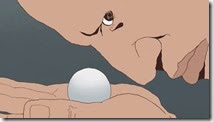 |
 |
 |
Who knew that Peco was Saint George all along?
I can’t say this turn of events has been anything but predictable – the true course of Ping Pong has been laid in for much of the series, and it was only a question of how we were going to get here. It’s a little too neat and proper for my tastes if I’m to be honest, and I don’t think this episode ever really bridged the credibility gap that was inevitably going to arise if Peco beat Dragon in a match (especially given his current condition). But that aside, it was certainly brought off with an abundance of style and panache.
I’ve enjoyed the hell out of many a sports series in which I knew next to nothing about the sport coming in – Hikaru no Go and Chihayafuru come to mind, and even Capeta to a certain extent. And I’m enjoying the hell out of Ping Pong, too but – somewhat ironically given that this is a sport I actually played constantly in my childhood – I don’t think I’ve ever so acutely wished I knew enough to understand the nuances of what was happening. Why is the twiddle so important to what Peco is doing? I wish I could tell you – I know it involves flipping the bat to utilitize the different surfaces on each side, but as a grandiloquent moment it’s somewhat lost on me. I’ve often felt over the course of this show that I was only getting half the picture, which I never really did with those other shows despite never having played Go or Karuta in my life. I guess it just goes to show that the gap between rec room ping pong and competitive table tennis is wider than similar gaps in almost any other sport.
This matters because this penultimate episode hinges on the moment when Peco turns around what’s been an utter whitewash (outscored 22-1 in the first two games) at the hands of Ryuichi and begins his miraculous comeback. And in truth, as a sports moment (though it was the most impressively animated ep of the series) it was largely lost on me – Ryuichi was dominating at one moment, Peco made a little speech to himself and all of a sudden he had the Dragon on the run, and his knee wasn’t a factor. I get that Peco needs to be close to the table and rely on quick attacks rather than let Dragon push him back, but I don’t really get what changed that allowed him to accomplish it.
What that leaves me with is the character side of the equation, and fortunately the episode almost totally works for me there. Peco’s transition into the hero role is now complete – not only is Smile waiting for him to soar into the sky, but Dragon is too. If anything this episode is more about him than it is about Peco, which I suppose is fitting as it’s largely his exit from the story. Dragon has basically been a tragic character for a good while, and as Peco has clarified his main character status so Dragon has with his. The poor guy is clearly lost – he plays out of desperation, driving himself forward out of fear. Fear of disappointing his grandfather, fear or losing, fear of having to face himself. He’s oblivious to the fact that the girl who loves him, Yurie, is leaving the country and hasn’t even bothered to tell him. He gets no joy out of what he’s good at – it’s a chore, a burden, and the only feeling it brings is “hollow”.
Peco is every bit as much Ryuichi’s opposite as he is Smile’s. The best moment of the episode comes when Obaba says “Don’t think too much Peco, you don’t have the brains for it”, and that sums him up very well. If ping pong success is joyless for Dragon it’s impossible without joy for Peco – it’s the sheer exuberance of his love for the game that powers his entire on-court (next to table?) persona. The whole bit about Peco’s infectious glee rubbing off on Dragon was laid on a bit thick in my view, but the point is effective enough – at long last, Dragon was able to stop thinking and just play. This is a game, and Peco’s success has always depended on never losing sight of that (and his downfall resulted from doing so) and at least Dragon had a few moments of exuberance himself before Peco sent him packing.
What now? Well, we have the matchup that’s been inevitable for weeks. Smile has been waiting for the hero to arrive, and here he is – so what will the kid who once looked like the main character do now? Will he follow the path of his coach and go easy on his opponent, or will he follow the teachings of his opponent and continue to be a ruthless machine? The most interesting element to me here is actually Butterfly Jo. I’d be very curious to hear what his truthful answer would be if you asked him “Do you regret what you did on that day, all those years ago?” This is not a black and white situation – if a guy steps into the ring, he’s stating that he’s healthy enough to fight and no opponent should be expected to hold back. But is Smile a happier boy now, having lived out Koizumi’s directions and become hard and cold, than he was before? I don’t think so, but that old Smile was hardly a whole figure either – he too seemed pretty joyless, able to find happiness only by extension, through Peco. As predictable as this ending is, it will still be fascinating to watch it play out.
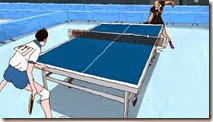 |
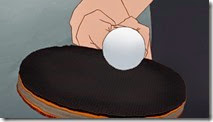 |
 |
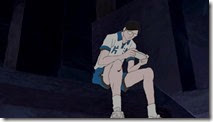 |
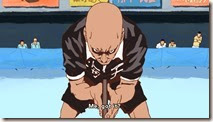 |
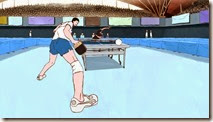 |
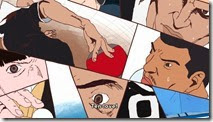 |
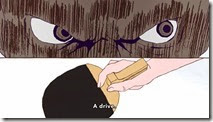 |
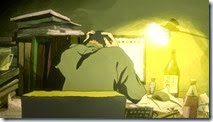 |
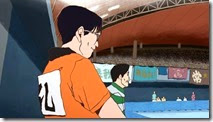 |
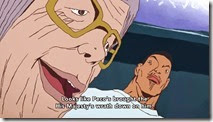 |
 |
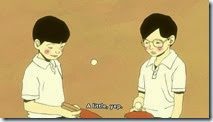 |
 |
 |
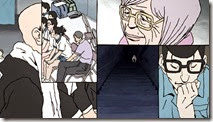 |
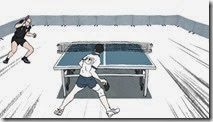 |
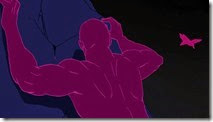 |
 |
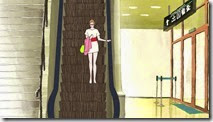 |
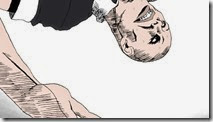 |
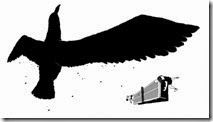 |
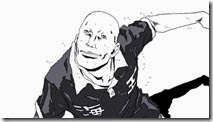 |
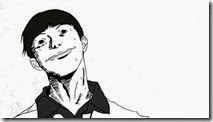 |


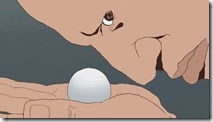
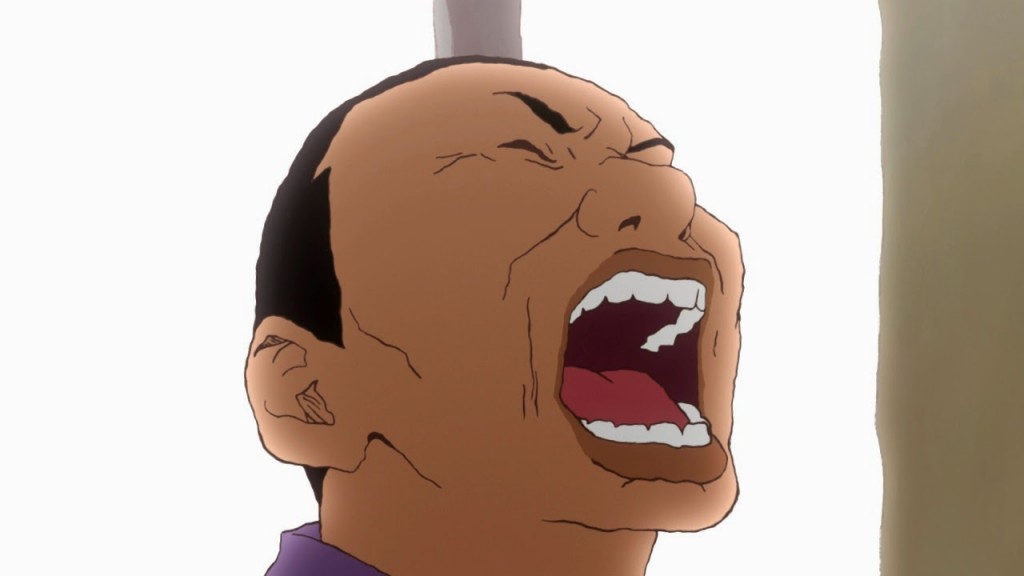
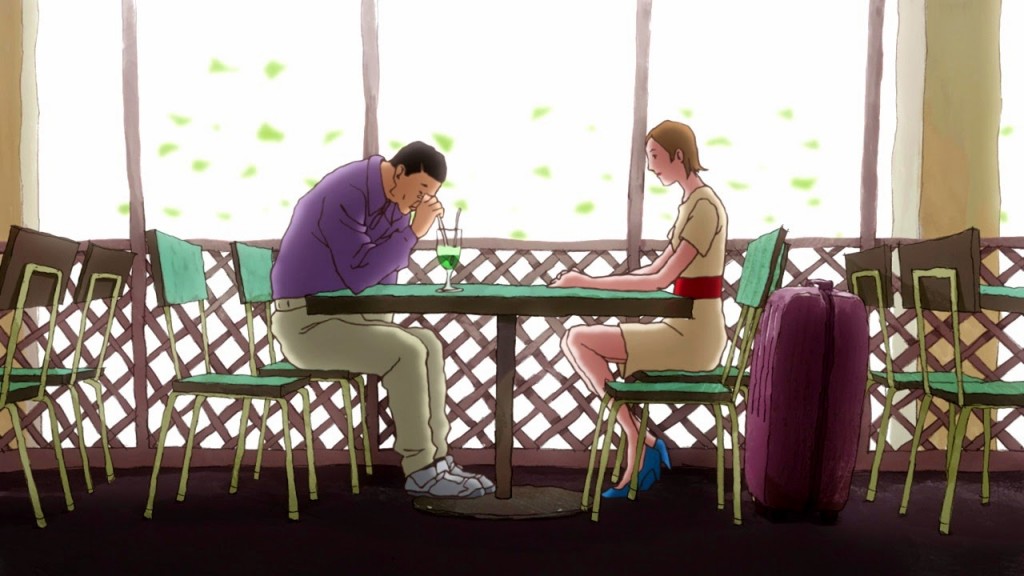
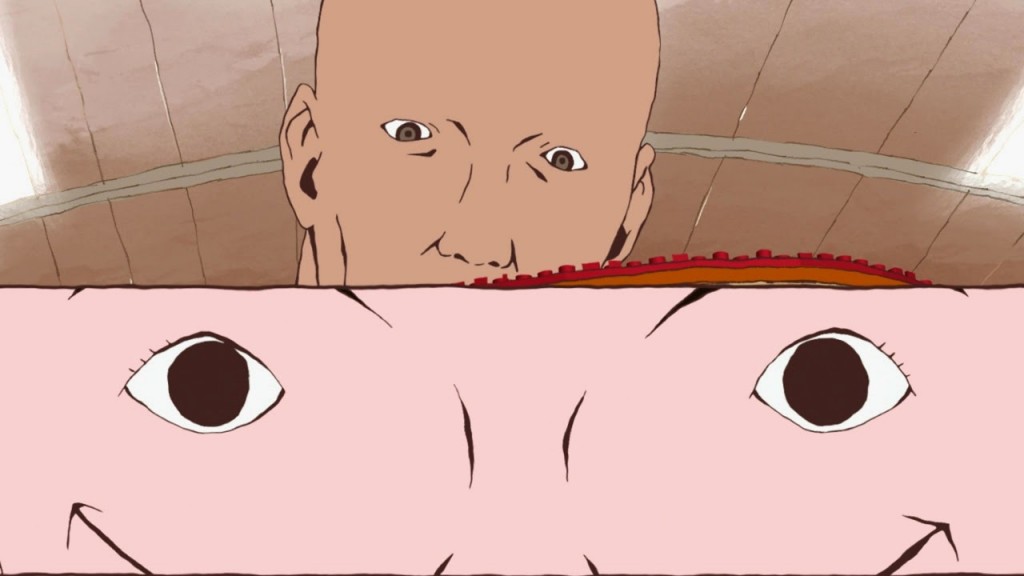
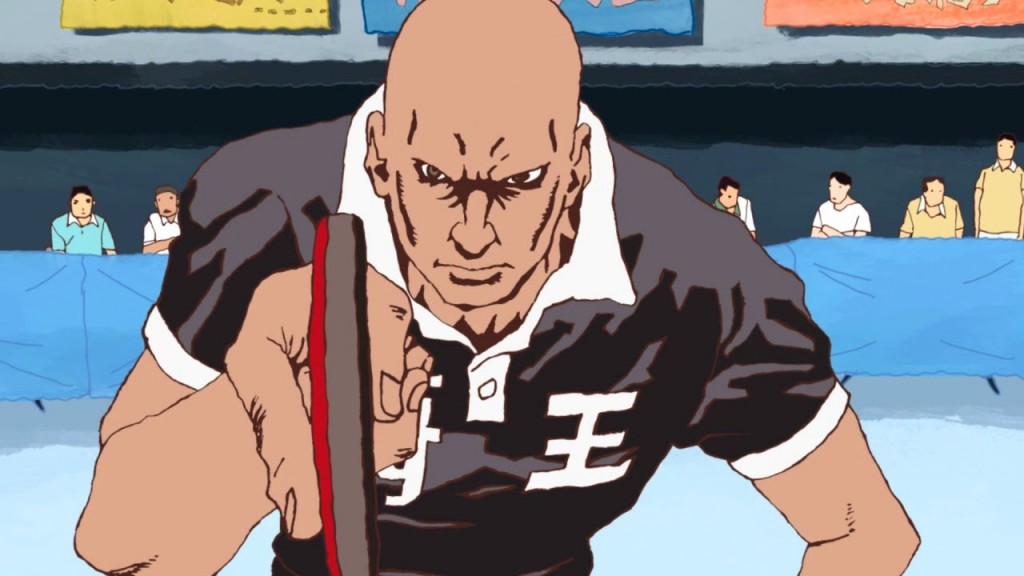
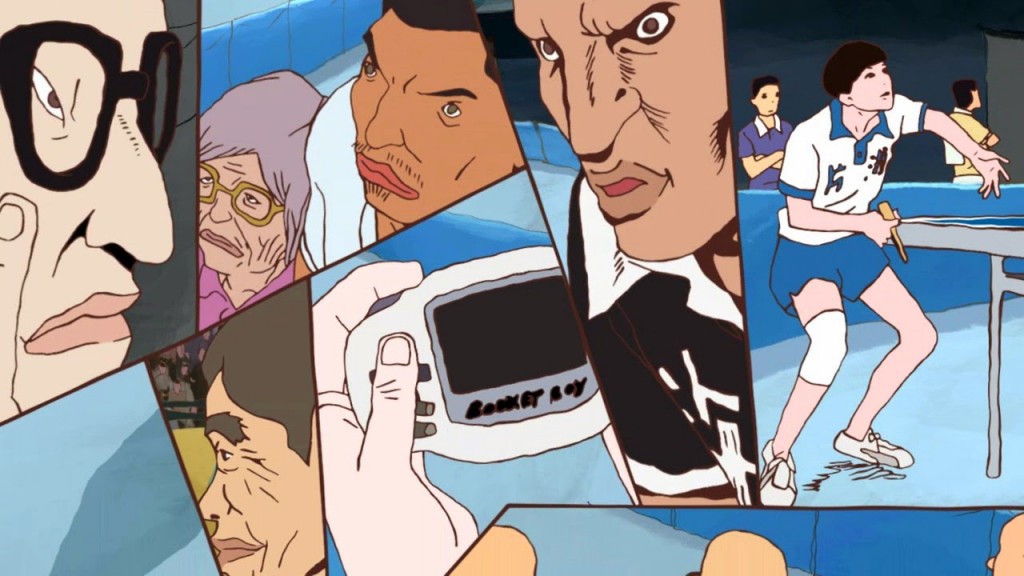
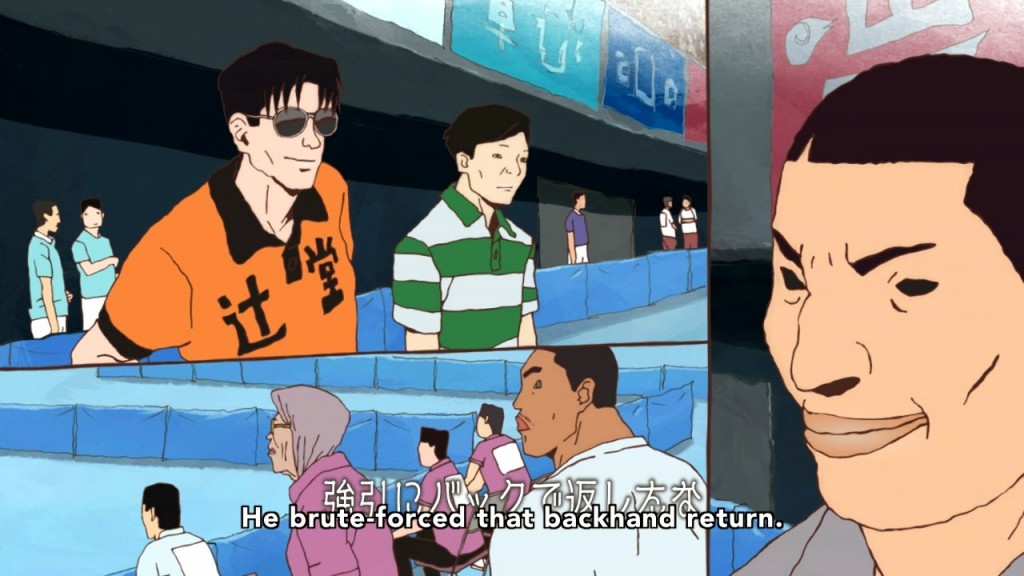
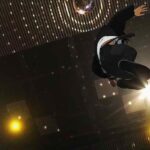

Sengdao Boutsivongsakd
June 13, 2014 at 11:23 amHey Enzo,
I've seen the Movie way back many times it's my favorite of all, and have been really impressed with this anime series. Although I knew what was going to happen the execution was flawless. I have to agree it did feel like it happened so soon and that there alot not explained about how Peco overcame his injury however the next episode may explain that. In a sense it was Peco that cured the Dragon making him realise not to forget to just play the game. I love the contrast when Peco was thinking if he should predict Dragon play. Then later after Peco does a miracle Dragon starts trying to think why he is on the back foot. The climax was both players playing their game at their best.
Defending the outcome of Peco winning you have to remember there have been many miracles in real life sport. I'm not going to mention many but a good example with the world cup going on back at the Japan South Korea world cup France lost straight away in the first round and were knocked out. Years later I watch Patrick Viera yesterday Reminisce about that day and he admitted the players didn't prepare well. Thats the beauty of sport it's unpredictable and the same goes to the outcome of Peco and Dragon match. Dragon had his game plan mocking Peco but highly underestimated him when Peco started to show his true form. Remember also Peco been passionate about Ping Pong since he was a kid and everyone he interacted like Smile took up the sport. The difference is Peco lives and breaths ping pong and he realise that now.
Not going to spoil the final episode all I'll say enjoy it. Not many sport animes out there can take you on a great journey and the real message is miracles do happen.
Seng
Nero
June 13, 2014 at 11:49 amI want Smile to win.
leongsh
June 13, 2014 at 12:30 pmThe episode did tell us what changed in Peco's play that had him recover to overcome Kazama. In the first 2 sets, Peco was trying to read what Kazama would play and react to it. When he thought too much, it slowed him down. What Peco realised in the 3rd set and is confirmed by Obaba's words is that he is a player of instinct and exuberance. He should just play for his sheer love of the game. It allowed him to play reflexively and he became unpredictable to Kazama causing Kazama to make errors.
Taku Sairenji
June 13, 2014 at 12:45 pmPeco's existence is very unreal that it feels like he's from a different world. A hero from a shonen manga to save the brutally realistic seinen world.
I was also trying to explain Peco's comeback but forgot about it towards the end. I use to live with a mindset Dragon had. Studied beacuse I was told to, worked hard for not failing. And I believe that's a common mindset in this world. If I were Kazama, I'd lose to Peco without a doubt. No logic. Just how I felt.
I can't express how moved I was at the end.
pjg
June 13, 2014 at 3:33 pmI disagree with you about the predictability of this series actually. I think for a a lot of sports series, it might have been more predictable for Dragon to have crushed Peco because his knee gave out as he was trying to come back to play for his friend, and then Smile would have had to have his revenge on Dragon in the final. We would have had a final in which we were clearly cheering for the odd protagonist playing for his friend versus the machine who had sold out to commercial interests and domination. Or perhaps it could have been set up for Smile to have lost to Dragon earlier and then Peco to come in and play the Hero again to crush Dragon in the end. In a previous review, you were even saying that you thought the coach was using Smile to perhaps beat Dragon, but that seems fairly unimportant here. Instead of a typical sports anime final match, we have one in which I suspect many people don't even care who wins. I know I don't. I really like Smile and probably would prefer he wins, but I realize that what Peco and Smile both want is just a great match of ping pong. I think it's kind of amazing to have brought the viewers to the point where we're looking forward to a final match but have no feeling of revenge or a sense that the protagonist will finally be able to "prove" himself. Instead we just want happiness for both players. I agree with you that I've been constantly wishing I learned more about the sport in this series, but that just hasn't been the focus. Instead we get a great picture of how a sport can be important for people in all different ways and make them happy in all different ways. One of the things I love most about Japanese sports anime (because I think we almost never have it in American sports movies or series) is that concept of how you want a really good rival. American sports series so often end with crushing the enemy rival instead of recognizing that destroying all worthy opponents leaves you like Dragon was.
Stöt
June 13, 2014 at 8:10 pmAbout flipping the bat:
Playing an opponent with a wicked spin is only bewildering for the first few returns. You quickly realise how much of an (opponents) movement will translate into what kind of spin and how to return it, if you're good. There's no other tells, really. You can't see the spin on the ball, you only tell by returning it and hoping it goes in the right direction.
So, if that opponent switches bat to a bat which enables him to transfer more or less spin, then you are again left in the dark until after a couple of more returns. So that's ultimately the point of showing the bat, so you know (kinda) what to expect. Otherwise you could play a guy who never returns with a forehand until the match point, and thus be completely flat-footed.
And yeah, the surfaces makes a whale of a difference, so some returns are better with certain surfaces. Surfaces with less spin potential = faster returns.
Anyway, that's my take of it.
John I.G.
June 14, 2014 at 12:48 amEssentially Peco's bat allows for speed and spin, in the first 2 rounds, he was so caught up in the tactics of Dragon, and trying to use the right side of the bat at the right time, that it took the simplicity and strength out of his game, and makes him slow and predictable.
Halfway through, he basically gives up on the bat, and turns the bat into an RNG, randomly picking a side and using that in the moment to the best of his ability. Peco is a player about improv and re-inventing things on the fly that people took years to come up with in the first place. Jumping is unusual in Ping Pong, that alone shows how carefree he is, how erratic and difficult to read his hits must be.
Also an enlightening point is when Obaba's son says "when did he learn to chop?" It just shows when he picks up ideas on the fly, and improvises he can bypass the opponents expectations, and the improv'd method is always done well, if not the best in the world.
So in this case the success was not based on the bat, it was based on forgetting about the bat.